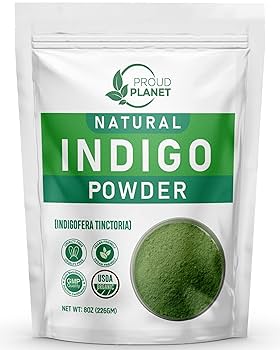Are you thinking about switching to a natural hair dye? Indigo powder has become a popular choice for those wanting a chemical-free color boost.
But before you apply it, you might be wondering: Is indigo powder truly safe for your Safe Hair Dye and scalp? You want to make sure it won’t cause irritation or damage. You’ll discover the facts about indigo powder, how it works, and what you need to know to keep your hair healthy and vibrant.
Keep reading to find out if indigo powder is the right choice for you.
What Is Indigo Powder?
Indigo powder is a natural dye used for coloring hair. It gives a rich, deep blue-black shade. People use it as a safe alternative to chemical hair dyes. This powder comes from the leaves of the indigo plant. Its use dates back thousands of years. It is popular in many cultures for hair care and coloring.
Origins And Composition
Indigo powder is made from the Indigofera plant leaves. These leaves are harvested and dried. Then, they undergo a natural fermentation process. This process releases the blue dye called indigotin. The powder contains natural pigments and plant fibers. It has no harsh chemicals or synthetic additives. This makes it gentle on hair and scalp.
Traditional Uses In Hair Coloring
Many cultures have used indigo for hair dyeing. It is common in India, Africa, and the Middle East. People mix indigo powder with water to form a paste. This paste is applied to hair to create dark tones. It can be combined with henna for reddish-brown to black shades. Indigo also conditions the hair and adds shine. Its natural origin appeals to those avoiding chemical dyes.

How Indigo Powder Works On Hair
Safety Profile Of Indigo Powder
Indigo powder is popular as a natural hair dye. Many want to know if it is safe for regular use. Its safety depends on its ingredients and how the skin reacts to it.
Understanding the safety profile of indigo powder helps you make a better choice. It also shows what to watch for when using it on hair.
Natural Ingredients And Chemicals
Indigo powder comes from the leaves of the Indigofera plant. It is free from synthetic chemicals found in many hair dyes. This makes it gentler on hair and scalp. No ammonia, peroxide, or parabens are usually present. Such chemicals can cause damage or dryness. Indigo powder is rich in natural pigments that color hair without harsh effects. It is often mixed with henna to create darker shades safely. The absence of strong chemicals lowers the risk of hair damage.
Allergic Reactions And Sensitivities
Some people may have allergic reactions to indigo powder. Skin sensitivity can cause redness, itching, or swelling. It is important to do a patch test before full application. Apply a small amount on the skin and wait 24 hours. No reaction means it is likely safe to use. Allergic reactions are rare but possible. People with sensitive skin should be careful. If irritation occurs, stop using the product immediately.
Expert Opinions On Indigo Powder
Experts share different views on using indigo powder for hair dye. Their opinions help us understand its safety and effects. This section explores what dermatologists and hair care professionals say about indigo powder.
Dermatologists’ Views
Dermatologists see indigo powder as mostly safe. It is natural and free from harsh chemicals. Many say it causes fewer allergic reactions than synthetic dyes.
Some caution that people with sensitive skin should do a patch test first. Indigo can cause irritation or redness in rare cases. They advise stopping use if any irritation appears.
Overall, dermatologists agree that indigo powder is a gentle option for hair color. It suits those who want a natural alternative.
Hair Care Professionals’ Insights
Hair experts like stylists find indigo powder effective for darkening hair naturally. They appreciate its conditioning benefits as it often comes mixed with henna.
Some mention that indigo powder requires careful preparation. It should be applied correctly to avoid uneven color. Professionals suggest mixing it fresh and using it soon after.
Experts also note that indigo powder does not damage hair like chemical dyes do. It keeps hair strong and shiny. Many recommend it for people seeking safe, natural hair dye options.
Comparing Indigo Powder To Synthetic Dyes
Comparing indigo powder to synthetic dyes reveals clear differences. Indigo powder is a natural product made from plant leaves. Synthetic dyes are created with chemicals in factories. These differences affect safety and hair health.
Toxicity Levels
Indigo powder has very low toxicity. It usually causes fewer allergic reactions than synthetic dyes. Synthetic dyes contain harsh chemicals like ammonia and PPD. These chemicals can irritate the scalp and skin. Some synthetic dyes may even cause long-term health risks. Indigo powder is safer for sensitive skin and those avoiding chemicals.
Long-term Hair Health Effects
Indigo powder nourishes the hair because it is natural. It does not strip hair of oils or damage the scalp. Using indigo powder regularly can improve hair strength and shine. Synthetic dyes often damage hair over time. Chemicals in synthetic dyes may cause dryness and breakage. Indigo powder supports healthier hair with less damage risk.
Tips For Using Indigo Powder Safely
Indigo powder is a popular natural hair dye. It offers a safe alternative to chemical dyes. Using indigo powder correctly ensures good results and healthy hair. Follow simple safety tips to avoid problems. These tips help protect your scalp and hair.
Patch Testing
Always do a patch test before full use. Apply a small amount of indigo paste on your skin. Choose a spot behind your ear or on your arm. Wait 24 hours to check for any reaction. Redness, itching, or swelling means avoid using indigo. Patch testing helps prevent allergic reactions.
Proper Application Techniques
Mix indigo powder with warm water to form a smooth paste. Apply the paste evenly on clean, dry hair. Use gloves to protect your hands from staining. Cover your hair with a shower cap to keep moisture. Leave the dye on for the recommended time only. Rinse hair thoroughly with water after dyeing.
Aftercare Recommendations
Use mild, sulfate-free shampoo to wash your hair. Avoid washing hair for 24 to 48 hours after dyeing. This helps the color set better and last longer. Moisturize your hair with natural oils or conditioner. Limit heat styling to keep your hair healthy. Regular care maintains vibrant color and strong hair.
Common Myths About Indigo Powder
Indigo powder is a popular natural hair dye. Many people have questions about its safety and effects. Myths about indigo powder often cause confusion. Clearing up these myths helps in making better choices.
Color Consistency Issues
Some say indigo powder gives uneven color. This happens mostly if the powder is not fresh. Old or low-quality indigo powder can cause patchy results. Proper mixing and application also affect color consistency. Using fresh powder and following instructions leads to even color. Color may vary slightly due to natural hair shades.
Suitability For Different Hair Types
Many believe indigo powder does not work on all hair types. Indigo powder works well on most hair textures. Fine, curly, or coarse hair can all take color. The key is proper preparation and timing. People with very light hair may need henna first. Indigo powder is gentle and safe for sensitive scalps.
Where To Buy Quality Indigo Powder
Finding quality indigo powder is key for safe and effective hair dyeing. Not all products are the same. Choosing the right source helps avoid harsh chemicals and poor results. Purchase from places that prioritize purity and natural ingredients. This ensures you get genuine indigo powder that works well on hair.
Trusted Brands
Look for brands with good reputations. Trusted brands often test their powders for safety and quality. They use organic or wild-harvested indigo leaves. These brands provide clear information about their sourcing and processing methods. Customer reviews can also show if a brand delivers pure and effective indigo powder.
What To Look For On Labels
Check labels carefully before buying. The label should say 100% natural or pure indigo powder. Avoid products with added chemicals, fillers, or synthetic dyes. Look for certifications like organic or cruelty-free. These labels suggest better quality. Also, check the country of origin. Indigo from India or Egypt tends to be higher quality. Clear instructions on use and storage are a plus.

Frequently Asked Questions
Is Indigo Powder Safe For All Hair Types?
Indigo powder is generally safe for most hair types. However, a patch test is recommended to check for allergies or sensitivities before full application.
How Does Indigo Powder Dye Hair Naturally?
Indigo powder works by binding to the hair’s keratin, creating a blue-black stain. It offers a natural alternative to chemical dyes without harsh effects.
Can Indigo Powder Cause Allergic Reactions?
Though rare, indigo powder can cause allergic reactions in sensitive individuals. Always perform a patch test 48 hours before use to ensure safety.
How Long Does Indigo Powder Hair Color Last?
Indigo powder color typically lasts 4 to 6 weeks. Duration depends on hair type, washing frequency, and aftercare practices.
Conclusion
Indigo powder is a natural option for hair dye. It usually causes less irritation than chemical dyes. Many people find it gentle and safe for their scalp. Still, a patch test is important before full use. Some may experience allergies or sensitivity.
Choose pure, high-quality indigo powder to avoid problems. Using it correctly helps get the best color results. Overall, indigo powder can be a safe choice for coloring hair. Try it carefully and enjoy a natural look.
Read More For Visit: skywirebox








